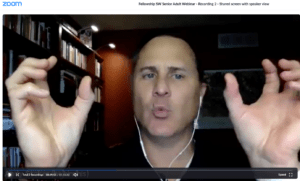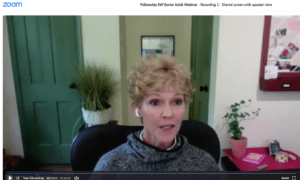Senior adult Christians can cultivate more energy, peace and compassion by embracing mindfulness meditation, a pair of United Methodist spiritual teachers said during a webinar hosted recently by Fellowship Southwest.

Andy Stoker discusses the practical benefits of meditation.
Mindfulness spiritual techniques also can help seniors navigate the challenges of the COVID-19 pandemic and a contentious election process, Sherrye Bass and Andy Stoker said during the Oct. 29 Zoom gathering titled “Second Half of Life.”
“We invite you to embrace Christian contemplation to find moments where you can simply be with God, simply be with Scripture and simply be with Christ in the Holy Spirit as we turn this page in the second half of our lives,” said Stoker, a mindfulness meditation teacher and senior minister at First United Methodist Church in Dallas.
Practices such as meditation can help us “see how God is living in us, through us and around us,” he said.
Mindfulness exercises also can inspire practitioners to cultivate sharper focus and dedication to serving others, said Bass, a mindfulness meditation instructor, Christian spiritual director and a member of Stoker’s church.
“We can do that by taking time to have a quiet moment with ourselves and with our God,” she said.
Sparking that connection for senior adults was the goal of the webinar, said Marv Knox, coordinator of Fellowship Southwest, a multicultural network launched by the Cooperative Baptist Fellowship.
“We believe mindfulness — awareness of God’s activity within us and around us — is vital for anyone, anytime,” he said.
Knox reiterated one of the themes Bass and Stoker touched on repeatedly during the virtual gathering: the intensely practical nature of contemplative practices.
“In this season of uncertainty and even calamity, helping seniors and church leaders tap into this divine resource seemed especially important,” he said. “Participants both learned about, and then practiced, experiencing God’s immediate presence. It’s an activity that makes all Christ-followers more resilient. And do we ever need resilience now.”
CBF Texas Field Coordinator Rick McClatchy said churches must teach people about spiritual disciplines.
“Increasingly, people are looking for this type of contemplative practice in their daily journey with God,” said McClatchy, who co-hosted the webinar with Knox. “They are seeking the presence of God in their daily lives, which the contemplative traditions have cultivated so well for centuries.”

Sherrye Bass shares about her contemplative Christian journey.
Bass and Stoker devoted some of their teaching time to dispel misconceptions about meditation and other contemplative practices, including “myths” that sitting in silent contemplation reduces spontaneity while leading to moral ambivalence and increasing distance from others.
Far from making him “mellow and sullen,” Stoker said meditation has boosted his energy level and helped him see how he can contribute to others’ well-being even in stressful times. “Actually, what I found is that the deeper I get inside of who I am, the more compassionate I am with the stranger and even my enemy.”
Citing international meditation teacher Jon Kabat-Zinn, Stoker described meditation as paying attention to what’s happening in the present moment with kindness and curiosity, and without judgment.
He also referenced author, speaker and Zen master Thich Nhat Hanh’s understanding of meditation as seeing life in slow motion while living in a fast-paced world.
“This is an invitation to live our lives in the here and now and to bring our best to every moment.”
Even 3 to 5 minutes of meditation a day can have a significant positive impact, he said. “We find ourselves being met with ourselves and potentially with the divine. This is an invitation to live our lives in the here and now and to bring our best to every moment.”
Bass said she initially ventured into contemplative practices as a Roman Catholic exploring the spiritual exercises of St. Ignatius of Loyola, the 16th century Spanish priest who founded the Jesuits.
While the teachers for their own training include Buddhists Jack Kornfield and Tara Brach, Bass and Stoker bring a Christian expression to mindfulness, she said. “I am definitely Christian, so it’s about trying to find that balance.”
And she added that meditation does not mean having to empty oneself, as is commonly believed. “What I appreciate about mindfulness meditation is not this emptying of oneself. It’s more focusing on the thoughts of the mind and doing it in a loving and compassionate way.”
Bass added that it is through getting in touch with self and with God that meditation practitioners gain a clearer understanding of their callings and of what they should avoid. “Always my question is: What is mine to do?”
Seeking answers to that question creates a bond between United Methodists and Baptists who attend CBF churches, Stoker said. They share “this idea that contemplation is good, but contemplation and action are better.”
Going inside, as he described meditative practices, helps “to discover what grace and gifts we have to bear on any issue of the day or in our personal lives or in our relationship with God.”
And inward journey through mindfulness meditation is a contemplative path that can help seniors embrace the current chapter of their lives, Stoker added. “Mindfulness meditation … is tapping back into that first breath that God gave me and finding that God is still awakening and enlivening my life.”


